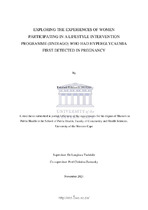| dc.contributor.advisor | Tsolekile, Lungiswa | |
| dc.contributor.author | Tshikovhi, Takalani | |
| dc.date.accessioned | 2022-03-18T09:08:27Z | |
| dc.date.issued | 2021 | |
| dc.identifier.uri | http://hdl.handle.net/11394/8937 | |
| dc.description | Magister Public Health - MPH | en_US |
| dc.description.abstract | Diabetes has become the second leading cause of death in South Africa. It accounts for 5.5% of South Africa’s total mortality. One of the major risk factors is Hyperglycaemia First Detected in Pregnancy (HFDP). The prevalence of HFDP is increasing, and it has become one of the common conditions found in women during their pregnancy. It is a significant risk factor for Gestational Diabetes Mellitus (GDM) in subsequent pregnancies and Type 2 Diabetes Mellitus (T2DM) in both mother and offspring. Emerging evidence suggests that a lifestyle change focused on healthier diets and increased physical activity can reduce the risk of progression to T2DM amongst women who had HFDP. Such interventions are usually provided to women with GDM as part of antenatal care. | en_US |
| dc.language.iso | en | en_US |
| dc.publisher | University of Western Cape | en_US |
| dc.subject | Intervention programme | en_US |
| dc.subject | Antenatal hospital | en_US |
| dc.subject | Postpartum care | en_US |
| dc.subject | Well baby clinic | en_US |
| dc.subject | Lifestyle behaviour change | en_US |
| dc.subject | Women | en_US |
| dc.title | Exploring the experiences of women participating in a lifestyle intervention programme (iindiago) who had hyperglycaemia first detected in pregnancy | en_US |
| dc.rights.holder | University of Western Cape | en_US |
| dc.description.embargo | 2023 | |

